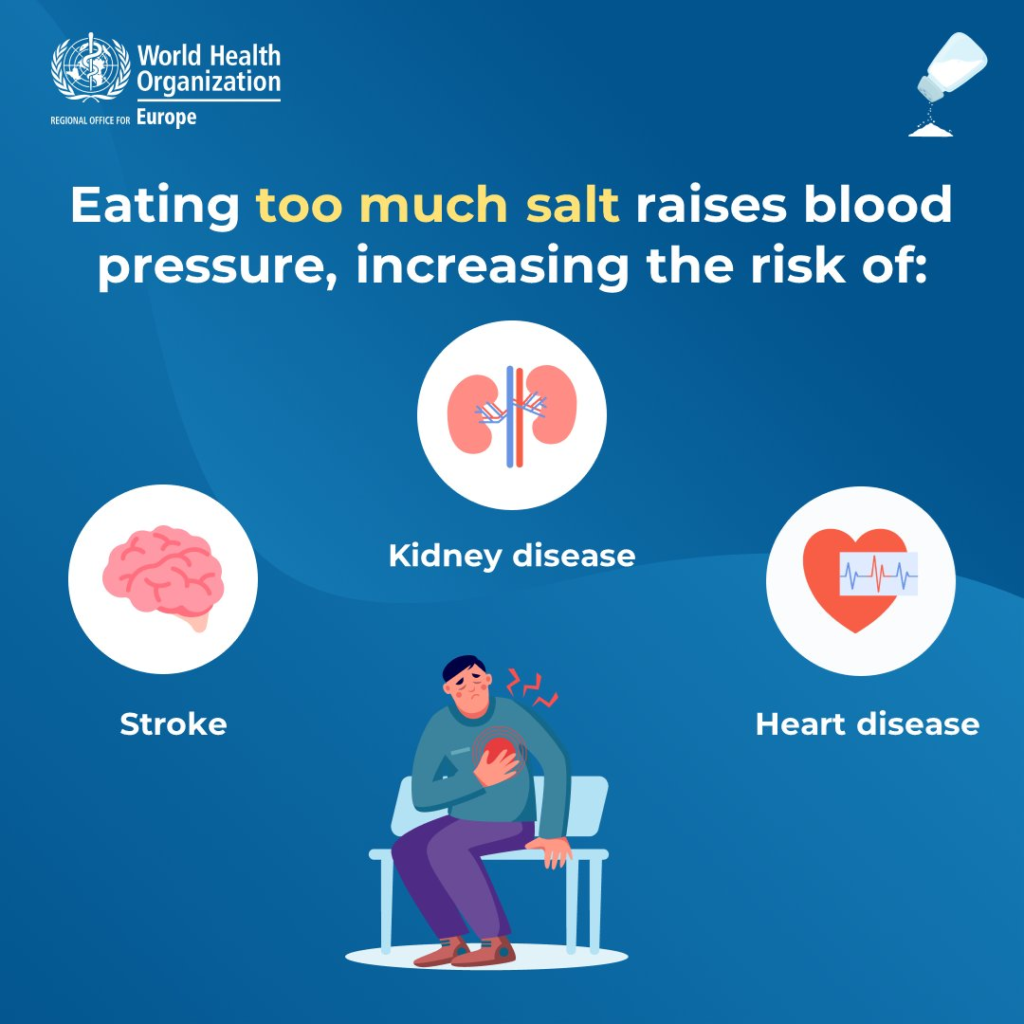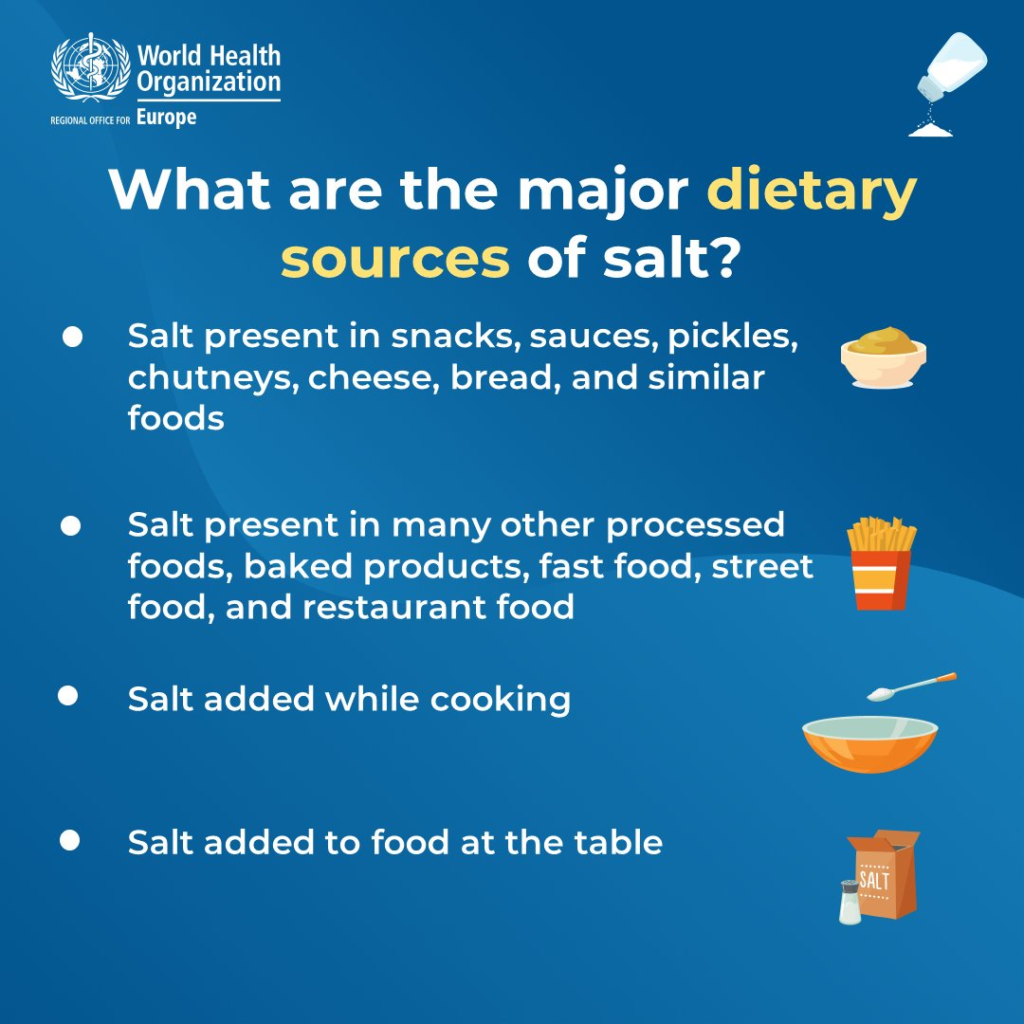The Benefits of Reducing Salt Intake: Why It Matters for Your Health
More evidence is emerging documenting links between high sodium intake and increased risk of other health conditions such as gastric cancer, obesity, osteoporosis and kidney disease.
For adults, WHO recommends consuming no more than 5 g of salt every day. For children the recommendation is even less: 2 g of salt a day. However, current daily salt consumption in the Region ranges between 8 g and 19 g – well above this recommendation.
A first-of-its-kind World Health Organization (WHO) Global report on sodium intake reduction shows that the world is off-track to achieve its global target of reducing sodium intake by 30% by 2025.
Sodium, an essential nutrient, increases the risk of heart disease, stroke and premature death when eaten in excess. The main source of sodium is table salt (sodium chloride), but it is also contained in other condiments such as sodium glutamate. The report shows that only 5% of WHO Member States are protected by mandatory and comprehensive sodium reduction policies and 73% of WHO Member States lack full range of implementation of such policies.

Introduction: Salt is a common ingredient found in almost every kitchen worldwide. While it adds flavor to our meals, excessive salt consumption can have detrimental effects on our health. In this article, we will explore the reasons why you should consider reducing your salt intake and the positive impact it can have on your overall well-being.
- Lowering Blood Pressure: One of the primary reasons to reduce salt consumption is to maintain healthy blood pressure levels. High salt intake contributes to fluid retention in the body, increasing blood volume and putting added strain on the arteries. Over time, this can lead to hypertension or high blood pressure, which is a major risk factor for heart disease, stroke, and other cardiovascular ailments. By reducing salt intake, you can help regulate your blood pressure and promote a healthier heart.
- Reducing the Risk of Stroke and Heart Disease: As mentioned earlier, excessive salt intake is closely linked to cardiovascular diseases such as stroke and heart disease. By moderating your salt consumption, you can decrease the risk of these life-threatening conditions. Lowering salt intake not only helps manage blood pressure but also improves artery health, reduces the risk of plaque formation, and maintains proper heart function.
- Kidney Health: The kidneys play a vital role in maintaining fluid balance and filtering waste products from the body. However, excessive salt intake can strain the kidneys, leading to impaired function over time. By reducing salt intake, you can lessen the burden on your kidneys and promote better kidney health. This is particularly important for individuals with existing kidney conditions or a family history of kidney disease.
- Enhanced Bone Health: While salt does not directly impact bone density, a high-salt diet can indirectly affect bone health. Excess salt intake increases the excretion of calcium through urine, which can lead to a gradual loss of bone mass and increase the risk of osteoporosis. By reducing salt consumption, you can help maintain proper calcium balance in your body and support stronger bones.
- Promoting a Healthier Weight: Consuming high-salt processed foods is often associated with overeating and weight gain. These foods tend to be calorie-dense but lacking in nutritional value. By reducing your salt intake and opting for fresh, whole foods, you can create a healthier eating pattern. This can help in weight management, as well as reduce the risk of obesity-related conditions such as diabetes and certain types of cancer.
Conclusion: Reducing salt intake is a simple yet effective step towards improving your overall health and well-being. By being mindful of the amount of salt you consume and opting for low-sodium alternatives, you can significantly lower your risk of developing cardiovascular diseases, maintain healthy blood pressure levels, support kidney function, enhance bone health, and even manage weight. Make a conscious effort to reduce your salt intake and embrace a healthier lifestyle for a happier and longer life.



